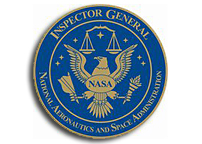NASA OIG: Audit of NASA’s Premium Air Travel

WHY WE PERFORMED THIS AUDIT
With limited exceptions, the General Services Administration’s (GSA) Federal Travel Regulation (FTR) requires Federal travelers to use coach-class accommodations when flying on commercial carriers. Among the exceptions allowing for first or business class (“premium-class”) air travel are to accommodate a documented medical disability; when traveling outside the continental United States and scheduled flight times, including stopovers and plane changes, exceed 14 hours; or when required by “agency mission.” At NASA for example, Johnson Space Center has defined agency mission to include ensuring that astronauts with demanding training schedules avoid excessive fatigue when traveling overseas.
In March 2014, several media reports called into question NASA’s use and reporting of premium-class travel, including travel by the NASA Administrator and Ames Research Center Director. Following these reports, the Senate Subcommittee on Commerce, Justice, Science, and Related Agencies, Committee on Appropriations, asked the NASA Office of Inspector General to perform an independent assessment of NASA’s policies for approving and reporting premium travel. In response, we initiated this audit.
WHAT WE FOUND
Generally, the 2 years of NASA premium-class travel we reviewed was properly authorized and complied with Federal and Agency travel policy. However, we identified four instances of premium travel that did not fall within any FTR or Agency exceptions, errors and omissions in some travel authorizations, and inaccuracies in NASA’s reporting of its premium travel to GSA. In addition, we found the Agency’s travel policy did not include several elements required by GSA.
Most Premium-Class Travel Tested Complied with Applicable Rules. From our sample of 75 travel legs over a 2-year period, we identified four legs that did not fall within any of the permissible FTR exceptions. For three of the legs – from Houston, Texas, to Moscow, Russia; from Moscow to Houston; and from Los Angeles, California, to Vienna, Austria, with a connecting flight in Frankfurt, Germany – flight times did not exceed the required 14 hours. For the fourth leg from Atlanta, Georgia, to Denver, Colorado, the traveler’s medical condition letter on file had not been updated annually as required by NASA policy.
We also identified 11 travel authorizations that were not routed through the designated premium travel approver and for which NASA could not provide documentation of verbal approval; 12 travel authorizations that did not include a justification for premium-class travel; and 2 authorizations in which the justification provided was incorrect. However, with the exception of one of the four legs referenced above, premium-class travel in each of these cases fell within the recognized exceptions and therefore was appropriate.
Premium-Class Travel Reporting to GSA Contained Inaccurate Information and Omitted Some Premium-Class Legs. NASA’s process for preparing and submitting its annual premium-class travel report needs improvement. Our testing disclosed that reports NASA submitted to GSA for fiscal years 2011 and 2013 failed to include some premium-class travel, incorrectly reported some coach-class legs as premium-class, and inaccurately reported the details of other premium-class travel. We also found that the exception codes (i.e., justification for using premium-class) NASA provided were incorrect 17 percent of the time in the 75 sample items reviewed. These inaccuracies occurred because NASA took minimal steps to validate information provided by GSA, including the reported cost of premium- and coach-class airfare when preparing its reports, and because the Agency did not provide clear guidance to the Centers regarding the need to validate information in the report. These shortcomings resulted in reports that provided an inaccurate view of NASA’s use of premium air travel.
NASA Travel Policies and Procedures Need Improvement. NASA’s travel policy does not include guidance on several premium-class travel topics required by the FTR and GSA such as the definition of specific mission criteria that justify premium travel. It also does not require travelers who change an approved coach-class fare to premium to file an amended travel authorization. Without an amended authorization, no approver sees the cost of the premium airfare until the expense report is submitted after the trip.
WHAT WE RECOMMENDED
To improve controls relating to premium-class travel, we recommended the NASA Chief Financial Officer (CFO) remind travelers, travel preparers, supervisors, and premium travel approvers of their roles and responsibilities and the valid exceptions for premium travel by including the topic in future training; provide guidance on the content of the certification statements substantiating that premium-class travel is necessary to accommodate a medical disability or other special need; and require verbal approvals of premium-class travel be documented in the Agency’s travel management system.
To ensure accuracy of NASA’s premium travel reports to GSA, we recommended the CFO document and distribute a process clearly defining the roles and responsibilities of all parties involved in preparation, validation, and submission of the reports and update NASA’s travel policy to ensure the information necessary to complete the reports is maintained in NASA’s travel management system.
Finally, we recommended the CFO review and revise its current premium-class travel policy to ensure it is comprehensive and current.
In response to a draft of this report, NASA management concurred with our recommendations and described the corrective actions the Agency plans to take. We consider management’s comments responsive; therefore, the recommendations are resolved and will be closed upon verification and completion of the proposed corrective actions.








